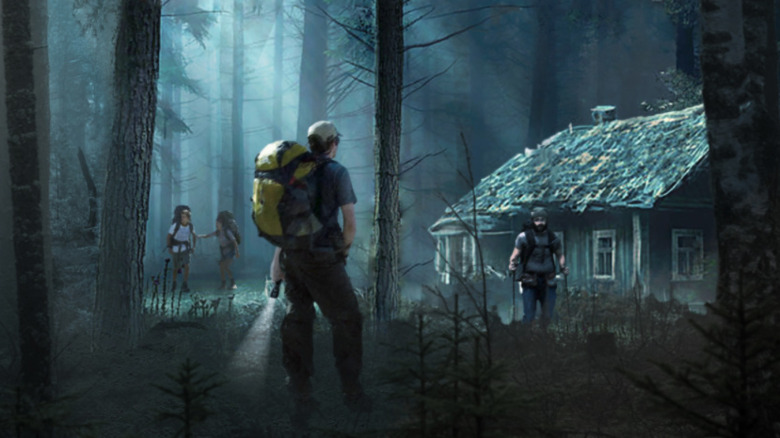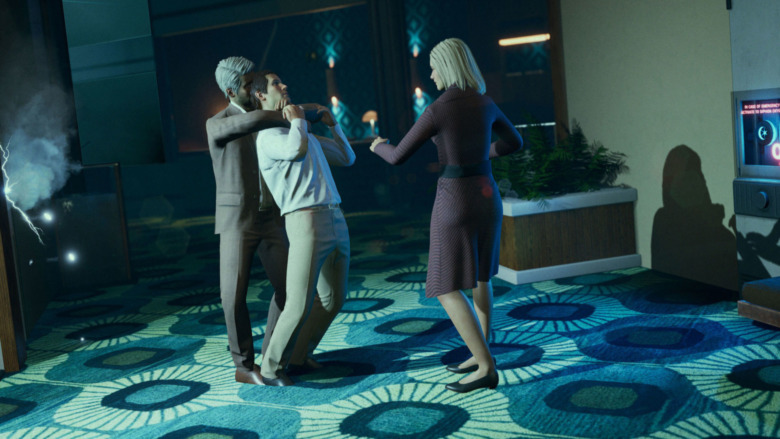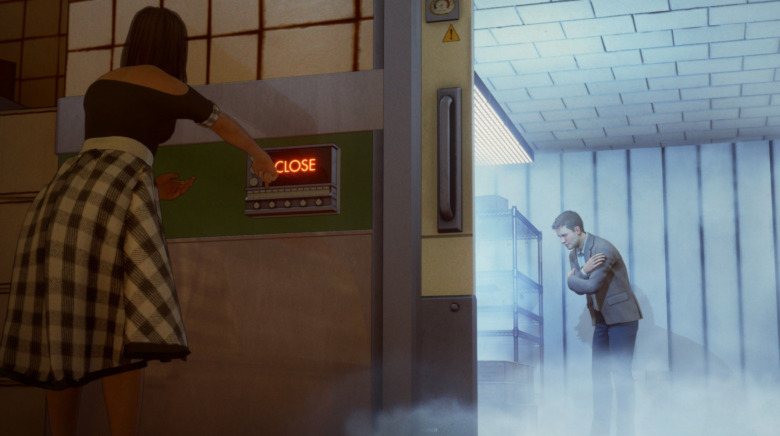The Untold Truth Of First Class Trouble
Sometimes a game comes out of nowhere and skyrockets into a viral hit. Just such a phenomenon occurred with InnerSloth's Among Us, which first released in 2018 before becoming a huge success in 2020 when gamers began streaming it on Twitch. In 2021, a new social game called First Class Trouble is set to follow in Among Us's footsteps.
First Class Trouble pits players against each other in a game of social deception. Survivors aboard a luxury spaceship must band together to live through an impending disaster, except some "survivors" are actually murderous robots that only look like humans. Together, the real survivors must shut down the ship's AI system — or die trying. First Class Trouble is a social experiment that pits friends, strangers, and everyone in between against each other. Only mayhem can ensue.
With First Class Trouble poised to take the streaming world by storm, it's time to examine just what makes the game so special.
First Class Trouble's developer and publisher have a pedigree
The developers behind First Class Trouble might seem familiar to some gamers. Invisible Walls is a small group of 21 people who are primarily interested in creating games that question social interaction. In 2017, Invisible Walls released Aporia: Beyond the Valley, a first-person open world game full of puzzles. Aporia won CRYENGINE's Indie Game of the Year 2017 award, meaning that it got some critical attention.
On the publishing side of things, Versus Evil is an indie publisher with several hits under its belt. Perhaps most notably, Versus Evil published The Banner Saga, a series of story driven games about Vikings that have been hidden gems in the indie world for years. It also published Yaga, which was featured on Apple Arcade in 2019. Versus Evil bills itself as an exclusive indie publisher dedicated to bringing independent games to all platforms.
With two experienced teams behind it, First Class Trouble had the financial and developmental backing it needed to get started. However, it wasn't always First Class Trouble. The game started on a very different path.
First Class Trouble was almost very different
Like many games, First Class Trouble went through a variety of developmental stages before landing on its early access version. In January 2018, Invisible Walls shared a sneak peek of its latest game, then titled Project Cainwood.
The concept of First Class Trouble seemed clear from the beginning. Invisible Walls described Project Cainwood as "a game of deceit and betrayal. You have to work together, but a player is hiding their true identity and in the shadows conducts unsavory deeds that actively works against your common goal of escaping the terrible pedicament [sic] you are in." The specifics of its setting weren't included in the initial description, but concept art from early development looks vastly different than First Class Trouble's finished product.
The concept art seems to be set in the real world, with a contemporary setting somewhere in a forest featuring campers with large backpacks. Invisible Walls hasn't discussed why the team scrapped this initial setting, but it did note that "over the coming months you will see many different art-styles represented, but overall looking very prototypical." The shift to a retro-inspired science fiction setting seemed to be the right move for First Class Trouble, and streamers have definitely taken to the aesthetic.
Streamers took to First Class Trouble quickly
Much of a game's success depends on a large player base, especially for titles that must be experienced collaboratively online. Fans flock to popular streamers like Corpse Husband, Sykkuno, Lilypichu, and Valkyrae to see their favorite personalities engage in social games. First Class Trouble is no exception.
In April 2021, Lilypichu streamed First Class Trouble with Corpse Husband, Toast, Valkyrae and Sykkuno. None of the streamers understood how to play First Class Trouble at first, and part of the fun was seeing them grapple with a new set of controls as they tried to deceive each other.
The team behind First Class Trouble also used an ingenious method to promote the game while bringing people to Twitch. Through Twitch drops, players could receive special in-game outfits and gear by watching 15 minutes of a listed, scheduled First Class Trouble stream. This partnership with streamers, with incentives for players as well, is something fans might see more in the future as streaming becomes more intertwined with the gaming industry.
First Class Trouble's team worked through hardships
While development for First Class Trouble heated up, the world went into lockdown as the coronavirus pandemic took hold. Invisible Walls worked throughout the pandemic, remotely, to ensure First Class Trouble stuck to a manageable schedule. The company even uploaded a series of vlogs about it.
In one video, a new programmer explained the challenges of working during a pandemic. He commented that as a student and developer, his life in lockdown was spent in front of his computer, with school and work both moving online. Even though his description of the lockdown experience seems bleak, it shows that production on First Class Trouble didn't stop just because a pandemic forced the team to work from home.
After a few months, the team reunited as lockdowns lifted at Invisible Walls' headquarters in Denmark, and development continued as normal. Many projects might have folded or been delayed by unexpected events like a pandemic, but First Class Trouble managed to release in early access successfully and with all the streaming fanfare it deserves.
First Class Trouble's team values feedback
Many game companies say they value feedback, but few implement changes the way First Class Trouble's team has. In an interview with Versus Evil, Niels Wetterberg, the creator of First Class Trouble, described how the team confronted player feedback head on.
One of the team's main goals was getting an alpha version of the game to playtesters as soon as possible. Because Invisible Walls received feedback on First Class Trouble in early stages of testing, it was able to incorporate feedback into the final version seamlessly. For example, Wetterberg said that early players wanted a way to defend themselves from would-be murderers in game.
"One night two people on the team created the champagne bottle mechanic," Wetterberg explained. "We immediately tested it, and it was a pretty big success. The next test showed that these types of 'silly mechanics' were popular and that we needed to add more of that humor to the game." Without player feedback, First Class Trouble may not have included that humor, or managed to be so playful.






